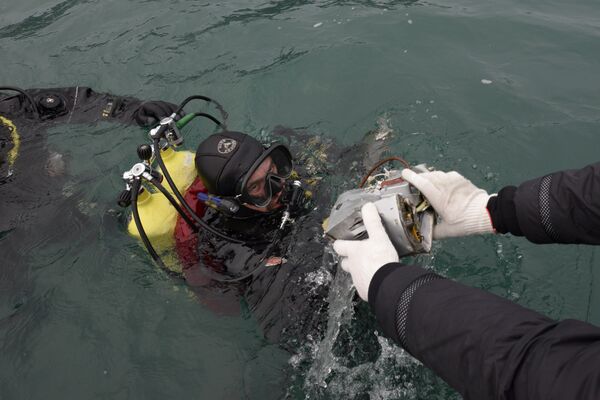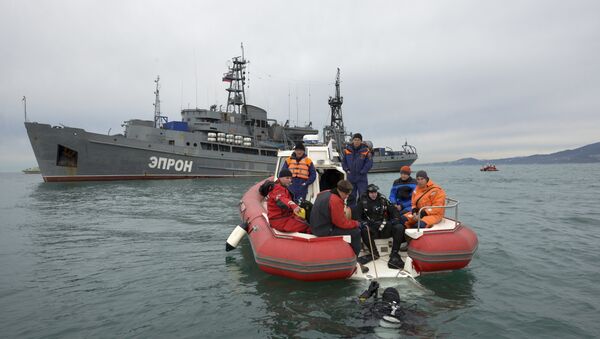The Tu-154 Russian Defense Ministry aircraft en route to Syria from Moscow crashed soon after takeoff near Russia's Black Sea resort of Sochi, killing all 92 people on board.
The plane was carrying eight crew members, 64 musicians from the Alexandrov Ensemble, nine reporters, the head of Spravedlivaya Pomoshch (Fair Aid) charity Elizaveta Glinka, and two civil servants.
The Russian Defense Ministry said in a statement on Tuesday that a preliminary analysis of the data obtained from a flight recorder recovered from the wreckage of the Tu-154 has allowed the experts to narrow down the possible causes of the incident.

According to the statement, experts from the Air Force Central Research Institute continue to decode data from the main flight recorder, which was recovered from the crash site on Monday and delivered to Moscow.
The Russian news network Life.ru quoted a source close to the investigation as saying that the final words uttered by the Tu-154's pilot indicated a possible flap fault.
Life.ru referred to the final recording of the cockpit before the crash, in which the pilot can allegedly be heard yelling "the flaps, damn it!" which was followed by "commander, we're going down." This has yet to be officially confirmed.
Life.ru also quoted Russian aviation expert Viktor Zabolotsky as saying that flaps-related problems typically lead to a situation where pilots finally prove to be unable to take control of a plane while in the air.
The matter is that the plane disappeared just at the point during the flight when the wing flaps should have been retracted, according to Smirnov.
"Flaps are released from under the wing, increasing its area, while changing the curvature of the flow. This is done to increase lifting strength and reduce the speed. Flaps are released before take-off and landing in order to produce a lower speed," he said.
Smirnov recalled that a whole array of plane crashes throughout the world were caused by the out-of-step operation of the wing flaps and that a Tu-154 plane is equipped with a device which automatically switches off the flaps in the event of a relevant problem.
#Zakharova on TU-154 crash: “Condolences to all. Irreparable loss, for they were indispensable.” #Sochi #Russia #crash #TU154 pic.twitter.com/1VhWGk13m4
— MFA Russia 🇷🇺 (@mfa_russia) 25 декабря 2016 г.
In this vein, Vzglyad quoted a source familiar with the situation as saying that either a technical glitch or a pilot error could be behind the Tu-154 crash.
The source did not rule out that the crew could have turned a blind eye to releasing the wing flaps ahead of the lift-off.
Smirnov, for his part, described the Tu-154 as a peculiar plane in terms of aerodynamics, recalling that the aircraft has all its three engines, each of which weighs more than a ton, in the tail, something that alters the impact of aerodynamic forces.
"Each Tu-154 aircraft has its own specific features, which should always be kept in mind. In particular, when you remove the flaps, it is necessary to act very cautiously," Smirnov said.
Meanwhile, Nikolay Antoshkin, former deputy chief of the Russian Air Forces, has said that a fuel system failure could have caused the Tu-154 to crash in the Black Sea.
Sad news… R.I.P.
— Malinka (@Malinka1102) 25 декабря 2016 г.
Russian Tu-154 plane crash
First VIDEO of search in Black Seahttps://t.co/91DkrEo9gc
"I think that if the engine fails, one should examine the fuel system. A rupture of a duct, a ducting or a flow divider valve could have occurred – one should look for a problem there," Antoshkin told RIA Novosti.
He also said that other possible problems are unlikely to have caused the crash.
He added that the time necessary to decode the plane's flight data recorder would depend on the damage the black box suffered.
Never miss a story again — sign up to our Telegram channel and we'll keep you up to speed!





